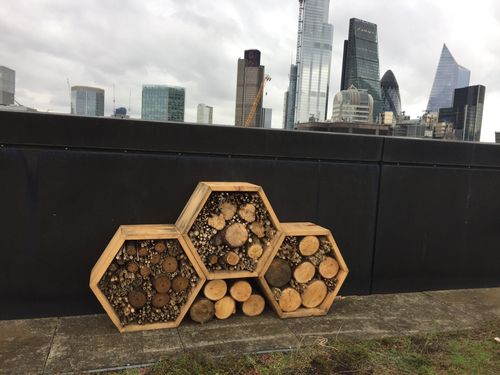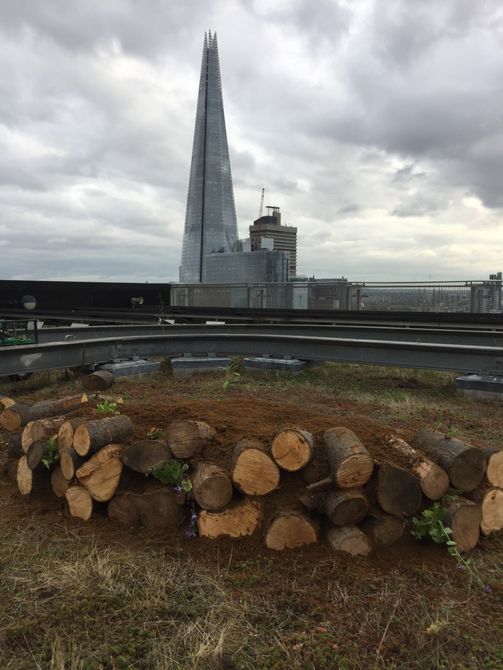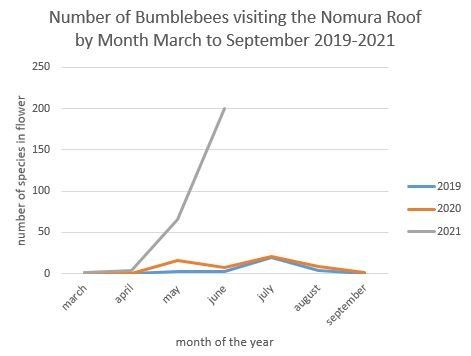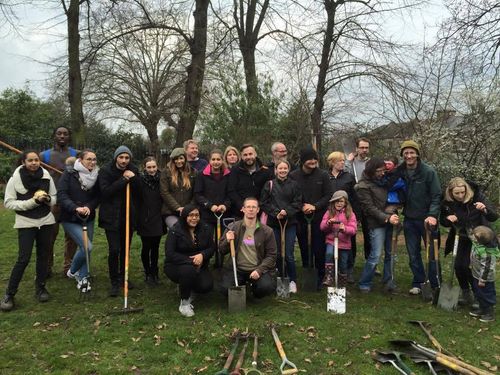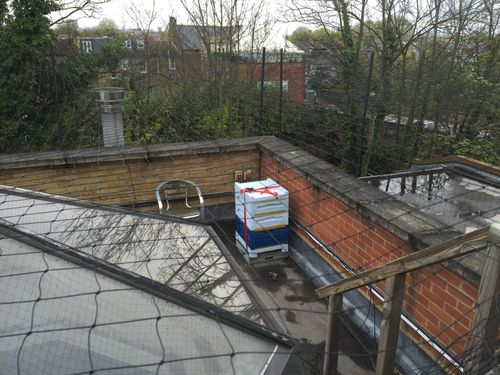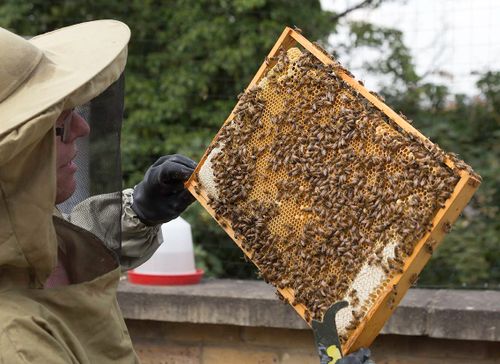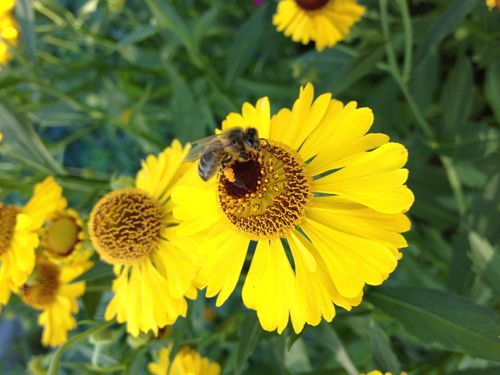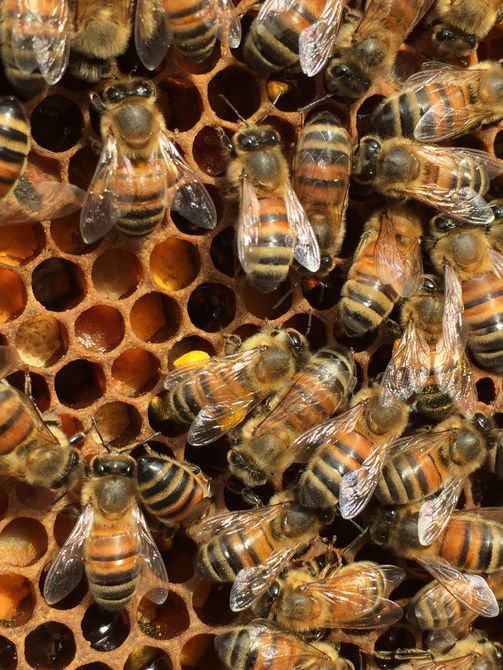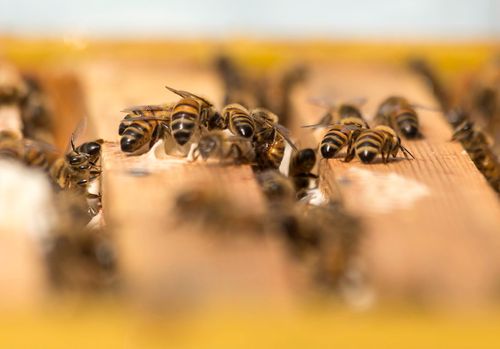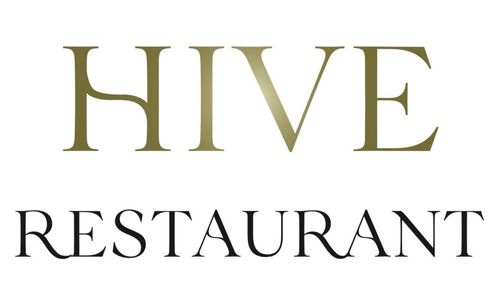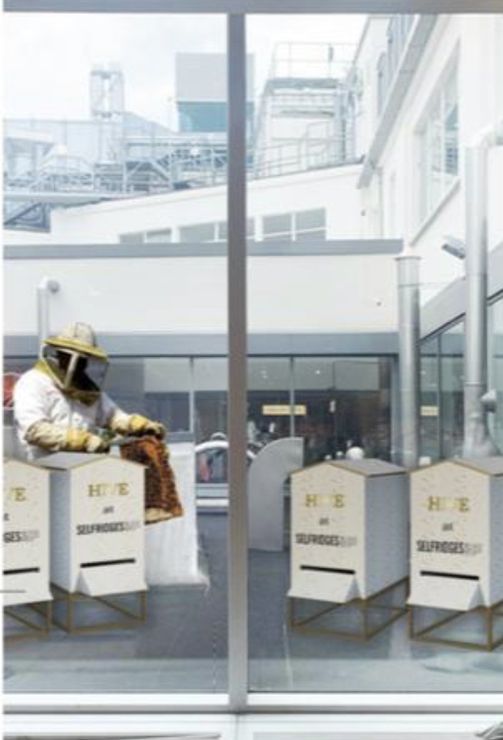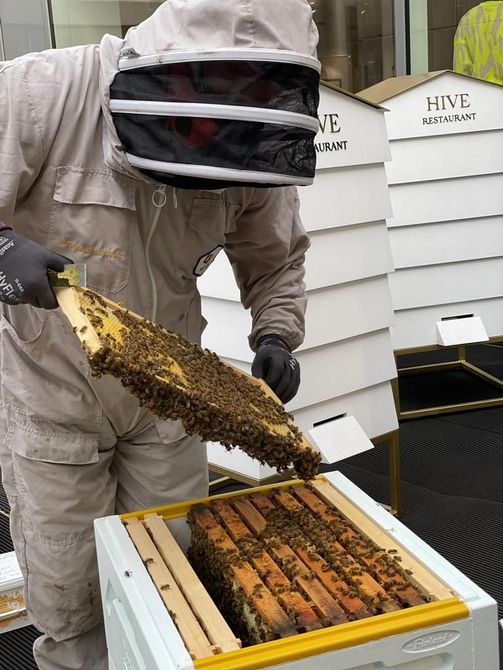- Nomura International PLC Green Roof
- City of London Corporation and the City Lord Mayor
- Chilli honey by Nando's 'Macho bees'
- St Pauls Way Trust School social Enterprise
- Our work with the 'Golden Company'
- Hive Restaurant, Selfridges & Co
- Our Work With TCES schools special educational needs children
- London Borough of Tower Hamlets Bees Acton Plan
- Catalyst Homes biodiverse Housing Estates
- The Great Green Estate
- 201 Bishops Gate
- Victoria Park Bee Monitoring
- University of Law
Corporation of London and the City Lord Mayor
In 2019 we embarked on a collaboration with the City of London.
We have installed 2 bespoke bee hives on the Mansion House roof for the City Lord Mayor. The bees are housed in Recycled Polymer hives which are encased in oversized WBC style lifts. The design creates superior thermal insulation over 76% more efficient than traditional wooden hives. Our hives were built for us by Eliot Hodge- a highly skilled joiner, carpenter and experienced beekeeper.
The hives design incorporates a replica of the Mansion House portico and Lanterns which sit atop the Patinated Copper Roofs.
The bees provide honey for the Mayor and Mayoress to gift to VIP guests at the Mansion House as well as auctioning off jars of Honey alongside visits to the bees with the Lord Mayors Beekeeper Mark Patterson. Thousands of pounds are generated each year through the auctions to raise funds for the Lord Mayors various charities.
We have also removed the fake plastic box planting in the Mansion House window boxes along the portico and replaced them with bee friendly flowers which provide pollen and nectar. The planting and soil are all organic and materials sustainably sourced. No peat or pesticides are used.
We are now represented on the City of London Biodiversity Action Plan steering group where we sit on the biological monitoring and pollinators sub committees. We are working with he City Corporations parks and gardens teams to produce a new and up to date BAP for pollinators as we have previously done for Tower Hamlets. The new City of London BAP is due for publication early spring 2022.
Prior to introducing the bees to Mansion House we removed 2 colonies of bees from the nearby London Stock Exchange meaning that the project did not result in any net increase in hive numbers in the city centre.
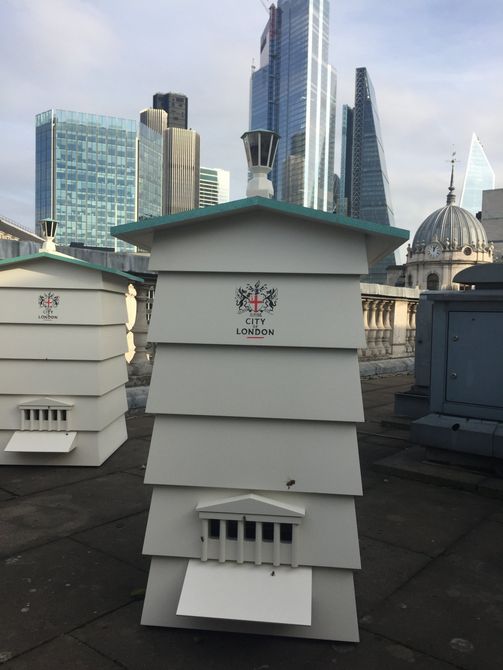
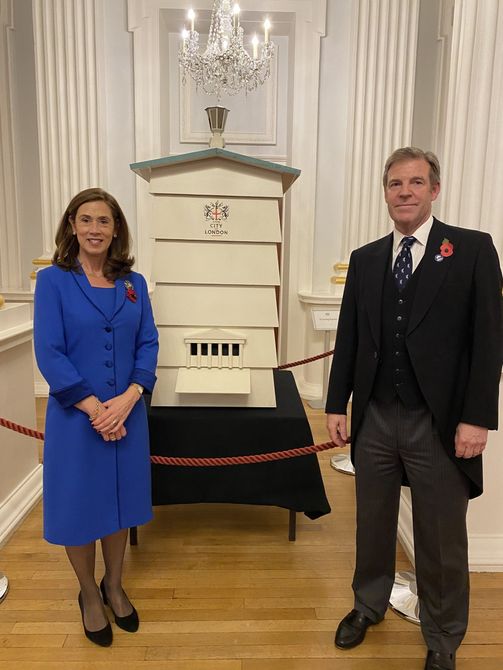
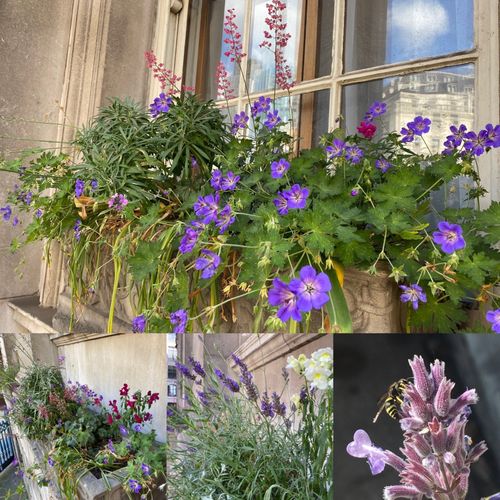
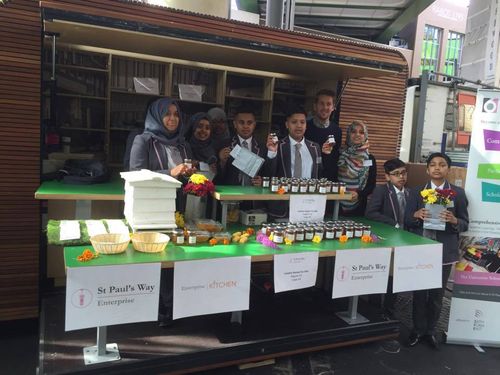
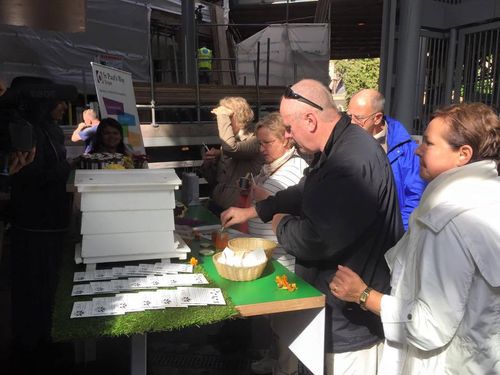

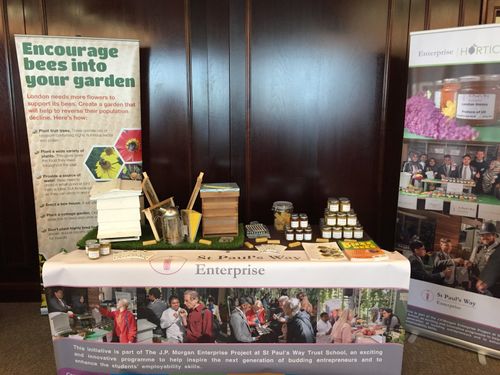
The Golden Company uses bees and beekeeping to nurture young people's hidden talents and provide them with valuable work experience leading to routes into employment. At the same time Golden Co. use their bees located at their corporate sponsors sites to engage corporate staff, educating them about bees and how we can all help improve the London environment for them.
Apicultural have been managing hives for the Golden Company at their sites throughout the city including the EU Headquarters of the National Bank of Japan NOMURA, London Stock Exchange and Law Firm Lewis Silkin. We work with a Golden Co. apprentice each Friday May to September visiting the corporate apiaries to inspect the bees accompanied by a small group of staff who attend to gain a taste of beekeeping and learn about the bees environmental requirements. We also preach allot to the clients about wild bee conservation and discuss their employers efforts to make London a better place for all pollinators. The benefits to the corporate sponsors include increased staff awareness about pollinators, awareness of the impacts of keeping honey bees, improved mental health and wellbeing and opportunities to volunteer and learn new skills.
Honey Harvested from the Golden Co. hives is processed by the apprentices who have a regular stall at Borough Market where they promote and sell their honey along side other sustainable products.
You can learn more about the fantastic Golden Co. by visiting their website http://www.thegolden.co/ or follow them on Twitter @thegoldenco
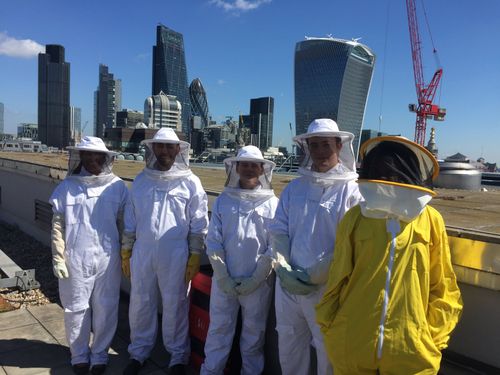
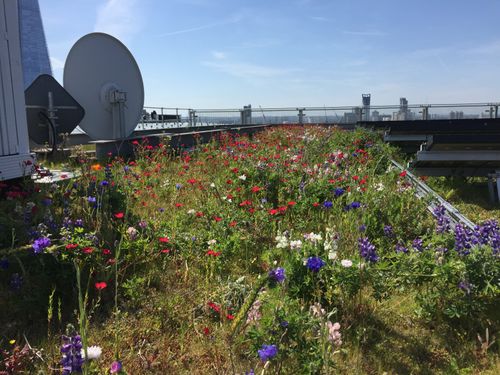
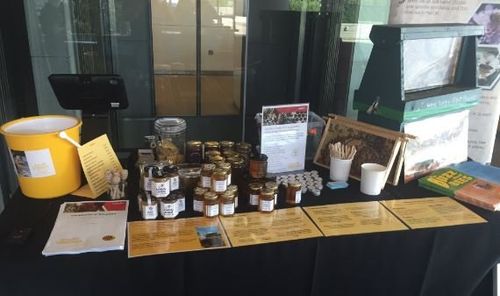
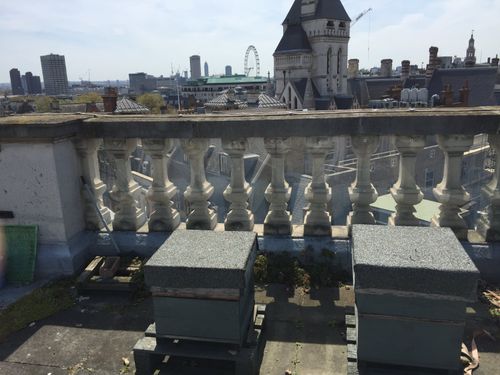
Our work with Hive Restaurant
Hive is a New Honey-Based Concept Restaurant which Launch at Selfridges, Oxford Street in November 2020.
Hive restaurant at Selfridges, a new honey-based culinary concept restaurant will be able to experience an immersive honey-inspired environment, with the modernist interior paying homage to the key ingredient of honey through botanical statement walls, decadent golden bee structures, and plant boxes with florals pollinated by the restaurant’s own bee population – which can be viewed dwelling just outside the window.
The restaurant welcomes diners to enjoy an all-day menu, which encompasses a range of innovative dishes that are healthy and comforting, and made with quality organic ingredients. Additionally, Hive will also offer a range of honey and cheese pairings to be enjoyed throughout the day, including Comte and Chestnut Honey, and Fourme d’Ambert with Buckwheat honey. For a truly unique honey-based dining experience, Hive will also be offering a cheese and honey afternoon tea experience, with diners able to choose from a range of delicious teas, Veuve Clicquot champagne, pastries and cheeses to compliment the exquisite range of natural honeys.
Khalid Samata, founder and owner of HIVE tells, ‘A few years ago, I fell in love with Honey. I discovered buckwheat honey and that tasting experience marked the beginning of my evolving journey. I enjoyed the taste of buckwheat honey so much that I became obsessed with how monofloral honeys are made.
For a year, I spent almost every weekend back home in the French Pyrenees, where I am originally from, to discover this buzzing ecosystem, to meet the local experts, to learn about bees, about flowers, about honeys, about the use of honey and its benefits to our health and wellbeing.
I wanted to bring my findings to the UK market. I partnered with Michelin Star Chefs to create the finest honey desserts that are now, served in the best restaurants in London. Because honey is a natural ingredient, I wanted to expand its use to all dishes and after much experimenting and imagination, HIVE Restaurant was born! We are so excited to open our doors and celebrate living life again with such a beautiful concept, amazing food and good company.’
Honey has earned a reputation as one of the purest and most natural ingredients for over 5,000 years, and is known to offer unique remedial qualities, including reducing anxiety, calming insomnia, and combating fatigue. The exceptional range of honeys utilised in Hive’s menu will be both harvested on-site from the restaurant’s own rooftop hives and procured by the artisanal farm Le Miel des Français, who’s selection offers a range of rich natural flavours, chosen to perfectly
compliment Hive’s menu.
The rooftop bees are looked after by experienced beekeeper and conservationist Mark Patterson, from Apicultural who will be using his expertise and knowledge to hold monthly talks in the restaurant about the critical importance of bees in the ecosystem.
Hive can be found on the third floor of Selfridges and will be open from 4th December.
Address and Opening Hours:
Hive Restaurant
3rd Floor Selfridges 400 Oxford Street London WA1 1AB
Reservations: OpenTable - 10 am to 9
.
part of our work with Hive has included advice on bee friendly planting on the restaurants 3rd floor roof terrace, advice on improving the Selfridges & Co 4th floor green roof, sustainable and responsible city centre beekeeping.
we have worked closely with Hive and design company Latierfive to design and manufacture unique bespoke hives for the bees at this location that will provide superior insulation and comfort for the bees.
there has been no net gain in central London hive numbers through this project as prior to introducing 2 colonies of bees will have removed 3 colonies from another nearby location.
keeping 2 hives of honey bees at this site comes with a substantive commitment to plant forage for city centre pollinators.
We are planning to bring in additional practitioners to deliver 'forest Schools' activities to some of their students and branch out to other campuses.
- Crop Plant identification
- Plant propagation, growth and development
- Pollination and pollinators
- Composting and soil ecology
- Animal care
- Horticultural tool use and maintenance
Catalyst Homes, Biodiverse Housing Estates
Between 2016 and 2019 we worked with Cataylst Homes social housing provider to make some of their West London housing estates greener and more wildlife friendly through the re-design of amenity planting areas, creation of wildlife habitats and community engagement.
- worked on 3 of their housing estates delivering biodiversity improvements.
- We have designed and planted orchards at two of their housing estates.
- Designed bespoke wildflower seed mixes to create two native wildflower meadows on two different estates each covering over 400m2
- Re-designed amenity planting beds and boring shrubbery at Windmill Estate replacing the planting with pollinator friendly varieties
- Engaged with residents and the local community by organising gardening courses, training and seed sharing.
- Installed composting areas for the community to use.
- Specified new native hedgerow to replace invasive snow berry and cherry laurel shrubbery around the sites perimeter
- re-designed an estate roundabout transforming it into a pollinator planting bed.
- For each site we wrote a management plan for the grounds maintenance team to follow.
- Provided training in meadow management.
The Great Green Estate with Polar Housing Association
in 2024 we worked with Poplar HARCA to secure funding from the Mayor of London's Rewilding Fund to transform boring amenity areas on social housing estates in Tower Hamlets.
Were working with landscape architects to design biodiverse features on 9 housing estates and delivering Biological monitoring to form a baseline of biodiversity on site before works begin and after completion to measure the success of the habitat interventions.
201 Bishops Gate green roof improvements
In 2024 we advised British Land and its Tenants against putting Hives on managed Honey Bees on one of its 12th storey roof tops on the Broadgate Estate, London.
The area already hosts unsustainable numbers of bee hives and there is growing pressure to reduce or at least curb the growth of hives in the City of London over fears they are having a detrimental effect on other pollinators through resource competition.
We advised British Land and its tenants to instead invest in some improvements to their existing green roof which would have far more beneficial impact on pollinators, biodiversity and the organisations sustainability goals.
Working with the estates grounds maintenance team from Q&S Ltd we designed and installed a number of hymenoptera nesting mounds, bee hotels, hoverfly breeding ponds and introduced additional beneficial plants like Kidney Vetch. We've also delivered some biologcal monitoring visits to measure the impact of the improvements.
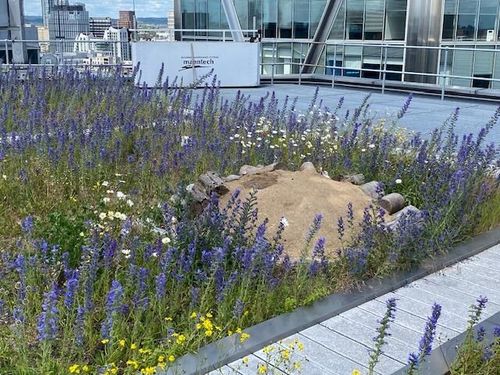
Victoria Park Bee Monitoring for Tower Hamlets Council
in 2023 we were commissioned by London Borough of Tower Hamlets to conduct a season long bee survey of Victoria Park. The park hosts several large music events each summer attracting tens of thousands of visitors which has a big impact of the parks ecology. The event organisers have funded a number of ecological surveys of the park as part of an ecological levy fund.
We were asked to survey 6 areas of the park using a combination of timed w transect walks counting all flower visiting insects and noting which species of plant they were using. We also conducted timed counts of 35 individual seasonal bedding displays recording pollinators visitations, monitored cavity nesting habitats used by bees and wasps and set up pan traps and a malaise trap.
Weve recorded over 40 species of Be between April and September including several nationally rare priority species.
using the data collcted weve written guidance on habitat management within the park, ideas for habitat improvements and contributted to the boroughs pollinator action plan.
University of Law
In 2024 we were approached by University of Law about helping pollinators on their London campuses. The University though adding hives of Honey Bees might be beneficial but had heard conflicting evidence that this may be the case. We quickly set the record straight and advised against Honey Bee hives and instead improve their green spaces.
In April 2024 we began work to completely make over their ground level roof garden which sites above the basement level library. The garden is a challenging space as the soil is only 1.5 feet deep, is heavy clay, prone to water logging and receives little direct sunlight.
We designed an eye pleasing garden that's also great for pollinators including shade loving flowers, fruit trees, flowering shrubs, winter flowering plants for winter active Bumblebees and solitary bee nesting habitats.
The work was hard as we had to add substantial volumes of sharp sand, grit and spent mushroom compost to the heavy clay soil to make it suitable for plants to grow.
The results come sumer was a beautiful garden that staff and students can enjoy alongside the bees.

